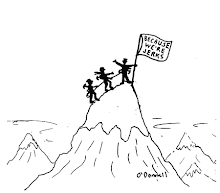This is a little thing I do that seems probably unimportant: I try to use more or less the same words my clients use. If some kid tells me he smokes weed, I don't later ask about marijuana or pot, though my natural default is pot. If he tells me his mother passed when he was 12, I don't ask how she died but how she passed, though that particular expression doesn't quite taste right, as an old boyfriend of mine used to say about idiomatic/unidiomatic uses of certain phrases.
[Oh this isn't exactly relevant but I think it's interesting so I'm putting it in brackets of optional disregarding: a phrase I don't think I'd end up using back at anyone but that I found sort of unexpected lately is something that I would express as "that made him really sad" comes out, among some of my clients, as "he got really sad behind that." Huh! I love these little verbal fillips in the not very interesting way one loves a lilac or a shade of green: there isn't much to tell about it.]
I think about the limitations of this from time to time. I am emphatically not into trying to talk to kids in some way that implies I'm anything but their dorky middle-aged social worker. I try to be informal because formality in this case is a defense that doesn't make anyone's day easier, and I try to present as eager to understand (as opposed to already in the position of understanding), but I resolutely do not try to pretend to speak their language. I understand why some people in my position do it. Adolescents, maybe especially certain socioeconomic demographics of adolescents that I end up talking to, are like George in A Room with a View: you're lucky to get so much as a yes or no out of them.
At some point, language isn't yours to borrow, and it's condesceding to do so, and probably it wouldn't endear you to anyone to do it. As an extreme example, I hear kids every day on the subway dropping what I'm told is now called the N-bomb at a rate of once a sentence, basically using it as a pronoun. It's the obvious example of insider-outsider language, not even mine to disapprove though it jolts me every time.
There's no thesis here. I once thought about writing a paper about using clients' words. This fellow who lived in the residential facility where I did my first-year internship would use this really funny, maybe deliberately formulaic language and I found myself wondering about the purpose it served for him. I'm tempted to quote an example or two, as I'm fairly sure I read his obituary years later and it feels harmless, but I'm not sure.
Anyway I didn't write the paper because as it turned out I'm not really interested in conferences and the like. Sometimes, though, I still think about R and [oh, fuck it] "Chilicothe, Ohio" (an example he'd use when listing where people might live who were ignorant about HIV) and Winnicott's writing about transitional experience, but also Roman Jakobson writing about words in an almost quaintly systematic way in an essay I think was called "Functions of Language."
I was a linguist once, you see. Or wanted to be.
Monday, May 3, 2010
Subscribe to:
Post Comments (Atom)

3 comments:
I understand what you mean about using similar words as your clients. I find myself adjusting my vocabulary when talking to different clients. It helps nurture rapport to a degree.
Thanks for including my link on your site!
I learned "behind that" from The Wire. "A whole lotta people lost their jobs behind that s***," for example. Can I curse on this blog?
Anatolia: don't mention it!
V^2: I would be distraught if you didn't!
Post a Comment